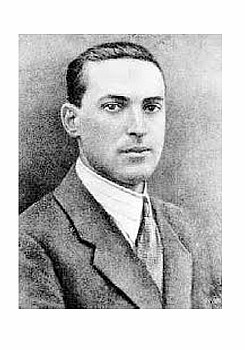|
- - - -
Lev Vygotskiy
VYGOTSKY Lev Semyonovich
(17.11.1896 – 11.06.1934)
Scientist and psychologist, art theorist, founder of the cultural-historical school in psychology
Vygotsky was born in the town of Orsha, Vitebsk region. Since 1897 he lived in the city of Gomel, where in 1913 he graduated from gymnasium. In 1917 he graduated from Moscow University and at the same time from the faculty of history and philosophy at Shanyavsky Public University. Since 1917 he taught in Gomel. Since 1924 Vygotsky lived and worked in Moscow. In 1924-1928 he worked at Moscow State Institute of Experimental Psychology, in 1927-1934 at the State Institute of Scientific Pedagogy under Leningrad State Pedagogical Institute in the name of Alexander Herzen, and at this institute, in 1929-1931 at the Academy of communist education, in 1927-1930 at the 2nd Moscow State University, in 1930-1934 at Bubnov Moscow State Pedagogical Institute, as well as in 1929-1934 at the Experimental Defectological Institute founded by himself. Vygotsky also gave lectures at a number of universities and research organizations in Moscow, Leningrad, Tashkent and Kharkov. In 1925-1930 he was a member of the Russian Psychoanalytic Society. He died and was buried in Moscow.
Vygotsky made a significant contribution to the history of psychology, pathopsychology, neuropsychology of defectology, psychology of emotions. He started his scientific career by studying psychological laws of the perception of literary works (“Psychology of Art”, 1925). Searching for methods to study objectively complex forms of mental activity and behavior of an individual, in his work "The Historical Meaning of the Crisis in Psychology" (1927) Vygotsky gave a critical analysis of the world psychology of the 1920-1930ies, which played a significant role in the development of psychology. In his book "The History of the Development of the Higher Mental Functions" (1931) he developed a general psychological concept known as "cultural-historical theory of mind", revealing the socio-historical nature of consciousness and higher mental functions, which was of great importance for educational psychology. Vygotsky proposed to distinguish two plans of behavior - natural (the result of fauna evolution) and socio-cultural (the result of historical development), which are combined during mental development. In the last years of his life Vygotsky focused on studying the correlation between thought and speech in the structure of consciousness (“Thinking and Speech”, 1934). He formulated the problem of age in psychology, offered a variant of child development periodization based on the alternation of "stable" and "critical" age, with regard to mental new formations specific to each stage. Vygotsky studied the stages of child's thinking development, proved that speech is social in origin as well as by function. Vygotsky created a new direction in defectology, showing the possibility of the defect compensation through the development of higher mental functions. He developed a new doctrine of the localization of higher mental functions in the cerebral cortex. Vygotsky's writings served the basis for modern educational psychology in the USA, in Europe within the framework of his theory the subject matter of social and economic psychology was developed. Vygotsky created a large set of research and methodical psychological tools by developing experimental genetic method of research in psychology and a number of specific techniques. Some of them, for example, the method of examining ability for abstract thinking through made-up concepts, proposed in 1927 (Vygotsky-Sakharov test), became widely known in science and practice.
Works:
1. Избранные психологические исследования. М.: АПН РСФСР, 1956.
2. Развитие высших психических функций. М.: Изд-во АПН РСФСР, 1960.
3. Психология искусства. 3-е изд. М.: Искусство, 1986.
4. Собрание сочинений. Т.1–6. М.: Педагогика, 1982–1984.
5. Психология развития человека. М.: Смысл, ЭКСМО, 2003.
6. The Collected Works of L. S. Vygotsky, Vols. 1 and 2. New York: Plenum Press, 1993.
Literature:
1. Леонтьев А. А. Л. С. Выготский М.: Просвещение, 1990.
2. Ярошевский М. Г. Л. С. Выготский: в поисках новой психологии. СПб.: Изд-во Международного фонда истории науки, 1993.
3. Выгодская Г. Л., Лифанова Т. М. Лев Семенович Выготский: Жизнь. Деятельность. Штрихи к портрету. М.: Академия, 1996.
4. Newman F., Holzman L. Lev Vygotsky: revolutionary scientist. N.Y.: Routledge, 1993.
5. Bodrova E., Leong D. J. Tools of the Mind: The Vygotskian Approach to Early Childhood Education. Englewood Cliffs, NJ: Merrill. 1996.
6. Daniels H. An introduction to Vygotsky. N.Y.: Routledge, 2005.

© National Academy of Sciences of Belarus, 2011
|
|


